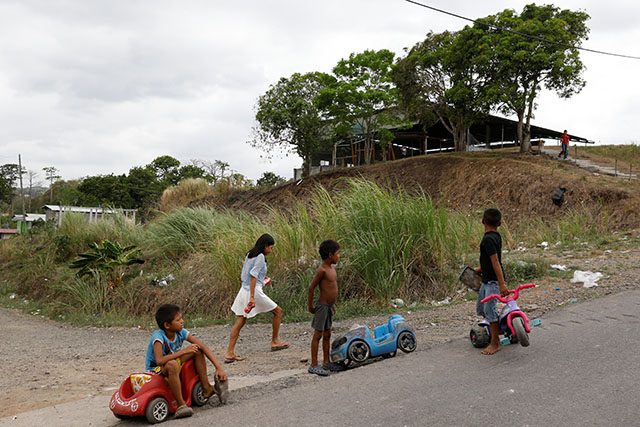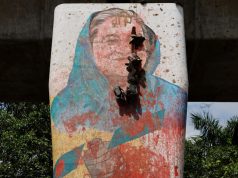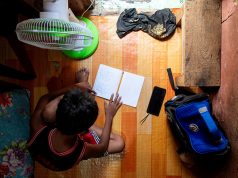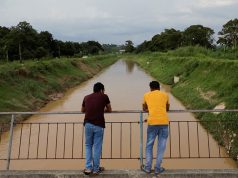
DHAKA — On a dusty football pitch in Bangladesh that doubles as grazing for cattle and laundry for local residents, teenage cricketer Sania Mirza hits the last ball of the innings to the boundary.
Next week, the 15-year-old trafficking survivor will be wielding her bat in the considerably grander surroundings of Lord’s cricket ground as one of eight chosen to represent Bangladesh in the first Street Child Cricket World Cup.
“This is like a dream to me. I can’t believe that I’ll be playing the World Cup. It’s unreal,” Sania, 15, told the Thomson Reuters Foundation before leaving Dhaka for Britain.
The competition, organized by British charity Street Child United, will pit teenagers from nine teams representing countries around the world against each other.
The tournament starts on Saturday and aims to draw attention to youth homelessness, a problem experts say leaves young people at risk of abuse and trafficking in many parts of the world.
There is no data on how many young people live and work on the streets, putting them at risk of exploitation, although the United Nations has estimated the figure at up to 150 million.
A study by the Consortium for Street Children, which represents children’s charities including UNICEF, said street children in rich and poor countries had “strikingly similar” experiences, facing violence from an early age.
The teams have been brought together by organizations that work with homeless and socially excluded children in their countries, from Bangladesh and Nepal to Mauritius and the Democratic Republic of Congo, with the aim of tackling stigma.
Sold into servitude
Sania now lives at a shelter run by the Bangladeshi charity called Leedo.
Three years ago, she was sleeping rough at a railway station after running away from the life of servitude she had been sold into by her desperate father.
The family had been forced to sell their small plot of land after Sania injured her arm and needed costly medical treatment.
Soon afterwards, her mother died, and when a local woman offered to take Sania to a couple that could employ her as a maid, her father agreed.
At first, she was well treated.
But that changed when the couple had their first child.
“The wife would beat me up with brooms and spoons every time I made a mistake. They would make me lift heavy things, even though they knew my hand was injured,” said Sania — now fully recovered from her injury.
Eventually, she ran away and got on to the first train she saw, arriving at Kamalapur station in the capital Dhaka, where she was found a few days later by rescuers from Leedo.
“I was scared,” she said. “There were many men at the station who asked me where I wanted to go. I ignored them. All I wanted to do was go back to my father. But I realized after running away that I didn’t know the way back home.”
Abuse
About 700,000 Bangladeshi children live on the street, a third of them in Dhaka, according to a European Union-funded study released this year.
Leedo tries to get to the children who arrive at Dhaka’s stations and ferry terminals and offer them help before the traffickers can get to them.
The charity runs a shelter and a mobile classroom — taking education to children who would not otherwise miss out.
“Stories like Sania’s are quite common,” said the charity’s founder Forhad Hossain.
“In the last four years, we have rescued more than 2,000 children from the streets. Their lives on the streets are not easy. Many of them are abused mentally, sexually and even trafficked as sex workers.”
The children at the Leedo shelter have been playing cricket for a couple of years, Hossain said, but excitement soared when they learned they would be competing in an international event.
It is the first cricket event the charity has organized, though it has previously held four football world cups, most recently in Moscow last year.
Marketing manager David Lyons said the goal was to get people listening to street children and change perceptions.
“We are creating a global platform for street children to perform. If we can change people’s perception of street children, we can change the way they are treated.”
Sania’s teammate Rasel Islam Romel once eked out a living as a porter at the Kamalapur station after running away from an abusive uncle.
Rasel’s father died before he was born and his mother had left home to seek work abroad, leaving him with her brother.
“My life changed as soon as my mother left. My uncle and aunt would torture me and punish me for the smallest of things,” said the 15-year-old, who now lives in a shelter — and harbors hopes of one day becoming a professional cricketer.
“I’ll play cricket in the place where the sport was born. I’ll be playing at Lord’s,” he said, his eyes lighting up.
“I don’t think many people can say that.”
— Reporting by Naimul Karim; Editing by Claire Cozens (Thomson Reuters Foundation)









